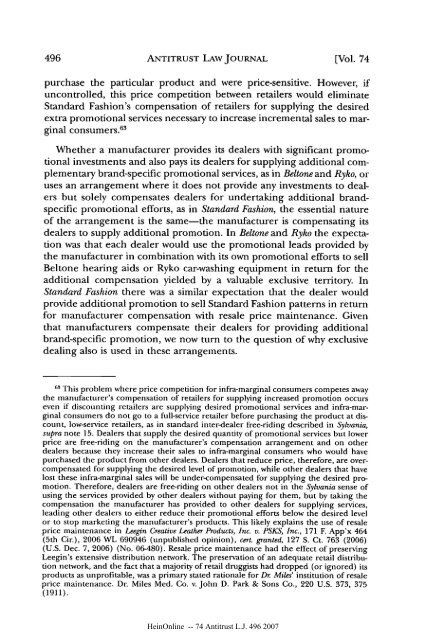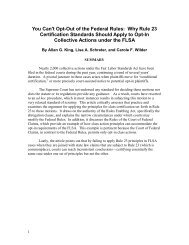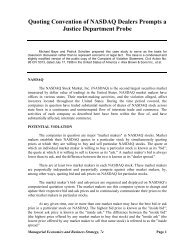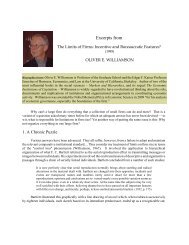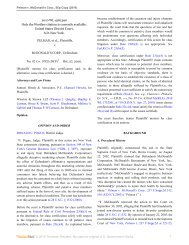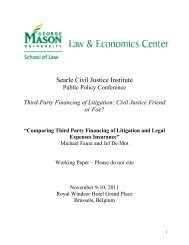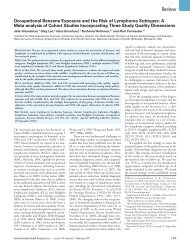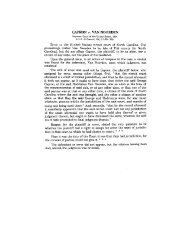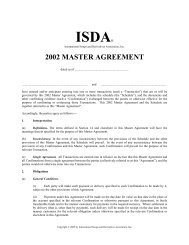Klein and Lerner, âThe Expanded Economics of Free-Riding: How ...
Klein and Lerner, âThe Expanded Economics of Free-Riding: How ...
Klein and Lerner, âThe Expanded Economics of Free-Riding: How ...
You also want an ePaper? Increase the reach of your titles
YUMPU automatically turns print PDFs into web optimized ePapers that Google loves.
ANTITRUST LAw JOURNAL[Vol. 74purchase the particular product <strong>and</strong> were price-sensitive. <strong>How</strong>ever, ifuncontrolled, this price competition between retailers would eliminateSt<strong>and</strong>ard Fashion's compensation <strong>of</strong> retailers for supplying the desiredextra promotional services necessary to increase incremental sales to marginalconsumers. 63Whether a manufacturer provides its dealers with significant promotionalinvestments <strong>and</strong> also pays its dealers for supplying additional complementarybr<strong>and</strong>-specific promotional services, as in Beltone <strong>and</strong> Ryko, oruses an arrangement where it does not provide any investments to dealersbut solely compensates dealers for undertaking additional br<strong>and</strong>specificpromotional efforts, as in St<strong>and</strong>ard Fashion, the essential nature<strong>of</strong> the arrangement is the same-the manufacturer is compensating itsdealers to supply additional promotion. In Beltone <strong>and</strong> Ryko the expectationwas that each dealer would use the promotional leads provided bythe manufacturer in combination with its own promotional efforts to sellBeltone hearing aids or Ryko car-washing equipment in return for theadditional compensation yielded by a valuable exclusive territory. InSt<strong>and</strong>ard Fashion there was a similar expectation that the dealer wouldprovide additional promotion to sell St<strong>and</strong>ard Fashion patterns in returnfor manufacturer compensation with resale price maintenance. Giventhat manufacturers compensate their dealers for providing additionalbr<strong>and</strong>-specific promotion, we now turn to the question <strong>of</strong> why exclusivedealing also is used in these arrangements." This problem where price competition for infra-marginal consumers competes awaythe manufacturer's compensation <strong>of</strong> retailers for supplying increased promotion occurseven if discounting retailers are supplying desired promotional services <strong>and</strong> infra-marginalconsumers do not go to a full-service retailer before purchasing the product at discount,low-service retailers, as in st<strong>and</strong>ard inter-dealer free-riding described in Sylvania,supra note 15. Dealers that supply the desired quantity <strong>of</strong> promotional services but lowerprice are free-riding on the manufacturer's compensation arrangement <strong>and</strong> on otherdealers because they increase their sales to infra-marginal consumers who would havepurchased the product from other dealers. Dealers that reduce price, therefore, are overcompensatedfor supplying the desired level <strong>of</strong> promotion, while other dealers that havelost these infra-marginal sales will be under-compensated for supplying the desired promotion.Therefore, dealers are free-riding on other dealers not in the Sylvania sense <strong>of</strong>using the services provided by other dealers without paying for them, but by taking thecompensation the manufacturer has provided to other dealers for supplying services,leading other dealers to either reduce their promotional efforts below the desired levelor to stop marketing the manufacturer's products. This likely explains the use <strong>of</strong> resaleprice maintenance in Leegin Creative Leather Products, Inc. v. PSKS, Inc., 171 F. App'x 464(5th Cir.), 2006 WL 690946 (unpublished opinion), cert. granted, 127 S. Ct. 763 (2006)(U.S. Dec. 7, 2006) (No. 06-480). Resale price maintenance had the effect <strong>of</strong> preservingLeegin's extensive distribution network. The preservation <strong>of</strong> an adequate retail distributionnetwork, <strong>and</strong> the fact that a majority <strong>of</strong> retail druggists had dropped (or ignored) itsproducts as unpr<strong>of</strong>itable, was a primary stated rationale for Dr. Miles' institution <strong>of</strong> resaleprice maintenance. Dr. Miles Med. Co. v. John D. Park & Sons Co., 220 U.S. 373, 375(1911).HeinOnline -- 74 Antitrust L.J. 496 2007


